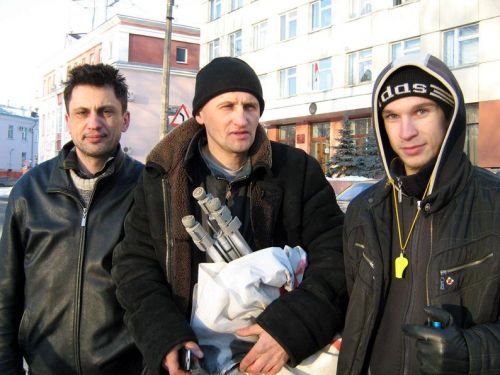Activists of unregistered Youth Front and the Belarusian Christian Democracy political movement organised an impromptu demonstration on the Lenin square in Homiel under a banner “KGB is forcing us out of jobs. Who will protect us?” (The statement rhymes in Belarusian.)
“We wished to attract attention of society to the fact that instead of protecting its citizens our country fires them and puts them into jails mainly because of political reasons," explained one of the detainees Andrei Tsianiuta in his interview to Radio Liberty. "We moved towards the Homel municipality. Police detained us. Now there are two administrative charges against me – for resisting police and organising an unsanctioned demonstration.”
At the Homiel Central precinct police officers forced opposition activists Vasil Tokaranka, Kastus Zhukouski and Andrei Tsianiuta to go through a personal search. Vasil Tokaranka shared the details of this search, “I’ve never seen anything of this sort anywhere in Europe. We were stripped naked! In a presence of some non-uniform persons they even forced me, I apologise, to take my underwear off. Outrageous!”
Valiantsin Stefanovich, a human rights defender, defined actions of the Homiel police as torture, “Perhaps, the police were in fact searching for something. According to the law it is allowed. However, it is troublesome that young people were stripped of their clothes in the presence of some unidentified individuals. Naturally, it could be considered abuse.”
 In that same day the opposition activists were sentenced by a court. Tsianiuta was fined 2 million 800 thousand BYR (around 1000 USD), Tokaranka received penalty of 1 million 750 thousand. One more detained activists, Kastus Zhukouski, was penalised for 3.5 million BYR (1300 USD) by judge Maryna Damenka.
In that same day the opposition activists were sentenced by a court. Tsianiuta was fined 2 million 800 thousand BYR (around 1000 USD), Tokaranka received penalty of 1 million 750 thousand. One more detained activists, Kastus Zhukouski, was penalised for 3.5 million BYR (1300 USD) by judge Maryna Damenka.
Belarusian human rights defenders claim that torture is widespread in the country, including against political opponents of the current regime. “The problem of torture is quite relevant in Belarus,” said Valiantsin Stefanovich to the Charter’97 press-centre. “In our country this problem has a latent character – it remains hidden. People are afraid of making official complaints when some outlawed methods or procedures are used against them.”
The Belarusian Criminal Code still does not have specific provisions against torture. “Instead of articles dealing with torture directly we have ‘abuse of official powers’. And the system works in such a way that very often these abuses are left unpunished,” noted Stefanovich.


